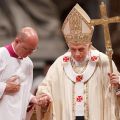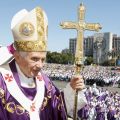At Holy Thursday Mass, Pope criticizes dissent from church teachings
VATICAN CITY - During a Mass in which priests renew their promises of fidelity to Christ, Pope Benedict XVI firmly criticized dissent from church teachings and disobedience of God's will as illegitimate pathways toward reform and renewal.
Surrounded by more than 1,600 priests, bishops and cardinals, the Pope cautioned against calls for women's ordination, saying such campaigns seemed more "a desperate push" to fulfill one's own preferences rather than a sincere attempt to conform one's life more closely to Christ.
During the April 5 chrism Mass in St. Peter's Basilica, which focuses on Holy Thursday as the day Jesus shared his priesthood with the apostles, the Pope said he wanted to use the occasion to ask all priests, including himself, to meditate upon what their consecration really means.
Pope Benedict's Holy Thursday homily [full text]
Below is the full text of Pope Benedict's homily given at the Holy Thursday chrism Mass in St. Peter's Basilica:
- -
RELATED ARTICLE - At Holy Thursday Mass, Pope criticizes dissent from church teachings
- -
Dear Brothers and Sisters,
At this Holy Mass our thoughts go back to that moment when, through prayer and the laying on of hands, the bishop made us sharers in the priesthood of Jesus Christ, so that we might be “consecrated in truth” (Jn 17:19), as Jesus besought the Father for us in his high-priestly prayer. He himself is the truth. He has consecrated us, that is to say, handed us over to God for ever, so that we can offer men and women a service that comes from God and leads to him. But does our consecration extend to the daily reality of our lives – do we operate as men of God in fellowship with Jesus Christ?
This question places the Lord before us and us before him. “Are you resolved to be more united with the Lord Jesus and more closely conformed to him, denying yourselves and confirming those promises about sacred duties towards Christ’s Church which, prompted by love of him, you willingly and joyfully pledged on the day of your priestly ordination?” After this homily, I shall be addressing that question to each of you here and to myself as well.
Two things, above all, are asked of us: there is a need for an interior bond, a configuration to Christ, and at the same time there has to be a transcending of ourselves, a renunciation of what is simply our own, of the much-vaunted self-fulfilment. We need, I need, not to claim my life as my own, but to place it at the disposal of another – of Christ. I should be asking not what I stand to gain, but what I can give for him and so for others. Or to put it more specifically, this configuration to Christ, who came not to be served but to serve, who does not take, but rather gives – what form does it take in the often dramatic situation of the Church today?
Recently a group of priests from a European country issued a summons to disobedience, and at the same time gave concrete examples of the forms this disobedience might take, even to the point of disregarding definitive decisions of the Church’s Magisterium, such as the question of women’s ordination, for which Blessed Pope John Paul II stated irrevocably that the Church has received no authority from the Lord. Is disobedience a path of renewal for the Church?
We would like to believe that the authors of this summons are motivated by concern for the Church, that they are convinced that the slow pace of institutions has to be overcome by drastic measures, in order to open up new paths and to bring the Church up to date. But is disobedience really a way to do this? Do we sense here anything of that configuration to Christ which is the precondition for true renewal, or do we merely sense a desperate push to do something to change the Church in accordance with one’s own preferences and ideas?
But let us not oversimplify matters. Surely Christ himself corrected human traditions which threatened to stifle the word and the will of God? Indeed he did, so as to rekindle obedience to the true will of God, to his ever enduring word. His concern was for true obedience, as opposed to human caprice. Nor must we forget: he was the Son, possessed of singular authority and responsibility to reveal the authentic will of God, so as to open up the path for God’s word to the world of the nations. And finally: he lived out his task with obedience and humility all the way to the Cross, and so gave credibility to his mission. Not my will, but thine be done: these words reveal to us the Son, in his humility and his divinity, and they show us the true path.
Let us ask again: do not such reflections serve simply to defend inertia, the fossilization of traditions? No. Anyone who considers the history of the post-conciliar era can recognize the process of true renewal, which often took unexpected forms in living movements and made almost tangible the inexhaustible vitality of holy Church, the presence and effectiveness of the Holy Spirit. And if we look at the people from whom these fresh currents of life burst forth and continue to burst forth, then we see that this new fruitfulness requires being filled with the joy of faith, the radicalism of obedience, the dynamic of hope and the power of love.
Dear friends, it is clear that configuration to Christ is the precondition and the basis for all renewal. But perhaps at times the figure of Jesus Christ seems too lofty and too great for us to dare to measure ourselves by him. The Lord knows this. So he has provided “translations” on a scale that is more accessible and closer to us. For this same reason, Saint Paul did not hesitate to say to his communities: Be imitators of me, as I am of Christ. For his disciples, he was a “translation” of Christ’s manner of life that they could see and identify with.
Ever since Paul’s time, history has furnished a constant flow of other such “translations” of Jesus’ way into historical figures. We priests can call to mind a great throng of holy priests who have gone before us and shown us the way: from Polycarp of Smyrna and Ignatius of Antioch, from the great pastors Ambrose, Augustine and Gregory the Great, through to Ignatius of Loyola, Charles Borromeo, John Mary Vianney and the priest-martyrs of the 20th century, and finally Pope John Paul II, who gave us an example, through his activity and his suffering, of configuration to Christ as “gift and mystery”. The saints show us how renewal works and how we can place ourselves at its service. And they help us realize that God is not concerned so much with great numbers and with outward successes, but achieves his victories under the humble sign of the mustard seed.
Dear friends, I would like briefly to touch on two more key phrases from the renewal of ordination promises, which should cause us to reflect at this time in the Church’s life and in our own lives. Firstly, the reminder that – as Saint Paul put it – we are “stewards of the mysteries of God” (1 Cor 4:1) and we are charged with the ministry of teaching (munus docendi), which forms a part of this stewardship of God’s mysteries, through which he shows us his face and his heart, in order to give us himself. At the meeting of Cardinals on the occasion of the recent Consistory, several of the pastors of the Church spoke, from experience, of the growing religious illiteracy found in the midst of our sophisticated society. The foundations of faith, which at one time every child knew, are now known less and less. But if we are to live and love our faith, if we are to love God and to hear him aright, we need to know what God has said to us – our minds and hearts must be touched by his word.
The Year of Faith, commemorating the opening of the Second Vatican Council fifty years ago, should provide us with an occasion to proclaim the message of faith with new enthusiasm and new joy. We find it of course first and foremost in sacred Scripture, which we can never read and ponder enough. Yet at the same time we all experience the need for help in accurately expounding it in the present day, if it is truly to touch our hearts. This help we find first of all in the words of the teaching Church: the texts of the Second Vatican Council and the Catechism of the Catholic Church are essential tools which serve as an authentic guide to what the Church believes on the basis of God’s word. And of course this also includes the whole wealth of documents given to us by Pope John Paul II, still far from being fully explored.
All our preaching must measure itself against the saying of Jesus Christ: “My teaching is not mine” (Jn 7:16). We preach not private theories and opinions, but the faith of the Church, whose servants we are. Naturally this should not be taken to mean that I am not completely supportive of this teaching, or solidly anchored in it. In this regard I am always reminded of the words of Saint Augustine: what is so much mine as myself? And what is so little mine as myself? I do not own myself, and I become myself by the very fact that I transcend myself, and thereby become a part of Christ, a part of his body the Church. If we do not preach ourselves, and if we are inwardly so completely one with him who called us to be his ambassadors, that we are shaped by faith and live it, then our preaching will be credible. I do not seek to win people for myself, but I give myself. The Curé of Ars was no scholar, no intellectual, we know that. But his preaching touched people’s hearts because his own heart had been touched.
The last keyword that I should like to consider is “zeal for souls”: animarum zelus. It is an old-fashioned expression, not much used these days. In some circles, the word “soul” is virtually banned because – ostensibly – it expresses a body-soul dualism that wrongly compartmentalizes the human being. Of course the human person is a unity, destined for eternity as body and soul. And yet that cannot mean that we no longer have a soul, a constituent principle guaranteeing our unity in this life and beyond earthly death. And as priests, of course, we are concerned for the whole person, including his or her physical needs – we care for the hungry, the sick, the homeless. And yet we are concerned not only with the body, but also with the needs of the soul: with those who suffer from the violation of their rights or from destroyed love, with those unable to perceive the truth, those who suffer for lack of truth and love.
We are concerned with the salvation of men and women in body and soul. And as priests of Jesus Christ we carry out our task with enthusiasm. No one should ever have the impression that we work conscientiously when on duty, but before and after hours we belong only to ourselves. A priest never belongs to himself. People must sense our zeal, through which we bear credible witness to the Gospel of Jesus Christ.
Let us ask the Lord to fill us with joy in his message, so that we may serve his truth and his love with joyful zeal. Amen.
Of bones, toothbrushes and dazzled eyes
In response to the question “How do I forgive?” I was given this answer: “By going against every bone in your body.” Forgiveness contradicts many basic inclinations, if we’re honest. It’s more natural to strike back, seek revenge, build stone walls. Forgive the one who inflicted harm? We might ask not only “how” but “why”?
Yet, astonishingly, forgiveness happens, in small ways and large. More than once, I’ve heard someone say, “I knew I had to forgive or I was going to die, so I forgave.”
Somehow, despite all the pain and struggle, forgiveness breaks through, the real thing, like those first tulips breaking up through the winter soil.
We will find a little of Thomas’ doubt in all of us
Second Sunday of Easter (Year B) April 15 (Acts 4:32-35; Psalm 118; 1 John 5:1-6; John 20:19-31)
There are many passages of the Scriptures that should have a more forceful impact on us but unfortunately do not. Perhaps we have heard them too many times or the countless compromises that we have made collectively with the demands of the Gospel have deadened our spiritual and moral awareness.
Live in love, forgiveness and conscience
Theologians sometimes try to simplify the meaning of the Resurrection by packaging its essence into one sentence: In the Resurrection, God vindicated Jesus, His life, His message and His fidelity. What does that mean?
Jesus entered our world preaching faith, love and forgiveness, but the world didn’t accept that. Instead it crucified Him and, in that crucifixion, seemingly shamed His message. We see this most clearly on the cross when Jesus is taunted, mocked and challenged: If you are the son of God, come down from there! If your message is true, let God verify that right now! If your fidelity is more than plain stubbornness and human ignorance then why are you dying in shame?
After papal request, Cuba makes Good Friday 2012 a national holiday
VATICAN CITY -- The Vatican spokesman praised Cuba's decision to accept Pope Benedict XVI's request to make Good Friday a national holiday this year.
"It is certainly a very positive sign," Jesuit Father Federico Lombardi, the Vatican spokesman, said April 1.
Good Friday, the commemoration of Jesus' passion and death, falls on April 6 this year.
Response to Christ's sacrifice must be gift of time, prayer, pope says
VATICAN CITY - The truly Christian response to Christ's death and resurrection must be the dedication of one's life and one's time to building a relationship with Jesus and being grateful for the gift of salvation, Pope Benedict XVI said.
"In this Holy Week, the Lord Jesus will renew the greatest gift we could possibly imagine: he will give us his life, his body and his blood, his love," the Pope said April 1, celebrating Palm Sunday in St. Peter's Square.
On anniversary of Blessed John Paul's death, Vatican focuses on WYD
VATICAN CITY - On the seventh anniversary of the death of Blessed John Paul II, Pope Benedict XVI paid homage to one of his predecessor's innovations: World Youth Day.
Greeting an estimated 5,000 cheering young people from Spain April 2, Pope Benedict said they were "the protagonists and principal recipients of this pastoral initiative promoted vigorously by my beloved predecessor, Blessed John Paul II, whose passage to heaven we remember today."
Bringing retreat reflection to the everyday
Upon returning from a Sisters of Life retreat in Connecticut, I decided my Lenten resolution would be to incorporate 20 minutes of prayer into my daily routine.
Finding it hard to fit prayer time into a hectic schedule, one of the sisters told me it might be helpful to get creative in my prayer life in order to better understand how God is speaking to me. So, along with the regular Hail Marys and Our Fathers, I started reading random Bible passages and keeping a journal to better open the lines of communication.
Finding God at work in our everyday lives
At some point who among us hasn’t wondered what God wants of us? Sometimes we may sense His calling but how do we know for sure?
Fr. Timothy Gallagher has dedicated many years to helping people who are seeking answers to these difficult questions. Through his ministry of retreats, the American priest provides spiritual direction by using the teachings of St. Ignatius of Loyola as a saintly roadmap to guide spiritual discernment and renewal.
At the invitation of the Sisters of Life, Gallagher directed a two-day discernment of spirits retreat on Mar. 17-18 at St. Catherine of Sienna Church in Toronto that was attended by about 225 people.
Pope, at Mass in Havana's Revolution Square, calls for full religious freedom in Cuba
HAVANA - Preaching at Mass in Havana's Revolution Square, location of the headquarters of Cuba's Communist Party, Pope Benedict XVI called for full religious freedom and greater respect for human rights on the island.
"In Cuba steps have been taken to enable the church to carry out her essential mission of expressing the faith openly and publicly," the Pope said during his homily March 28. "Nonetheless, this must continue forward."
With President Raul Castro seated near the altar platform, the Pope said, "I wish to encourage the country's government authorities to strengthen what has already been achieved and advance along this path of genuine service to the true good of Cuban society as a whole."










